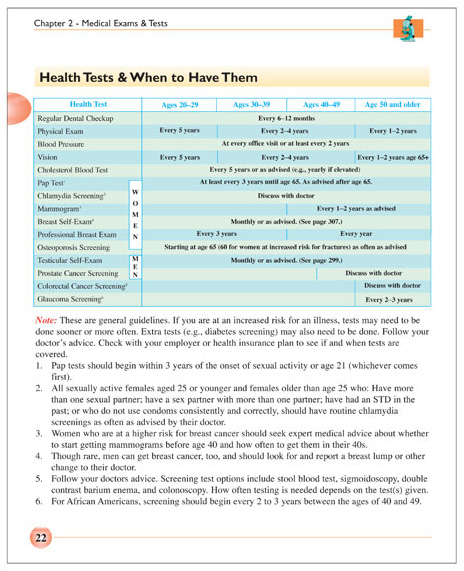
| Introduction | You & Your Provider | The 4 Rs | Being a Wise Consumer | Your Home Pharmacy | Review |
| Common Health Tests & When to Have Them |
|
Another important part of being a wise health care consumer is to know some basic facts on common health tests and how often you should have them. |
|
The “Health Tests & When to Have Them” chart provides basic guidelines for healthy individuals who are experiencing no symptoms of illness. If you have an increased risk or family history of a particular illness, testing may need to be done earlier or more often. The National Cancer Institute recommends that routine mammograms begin at age 40. For women at high risk, however, i.e., women who have a mother or sister who has breast cancer, it would be advisable to have a first mammogram ten years earlier than the age at which their mother or sister developed breast cancer. That means that if their mother was 42 at the time of diagnosis, they should have their baseline mammogram at 32. Recommendations for when and how often to have mammograms vary from different organizations. Women should check with their health care provider for his or her recommendation for mammograms and find out if and when mammograms are covered by their health plan. This applies to other tests, as well, for both women and men.
|
|
|
|
Now, locate your age bracket and note those tests that fall under it. Write them down and discuss them with your doctor or health care provider at your next visit.
Have you had these health tests according to the recommendations? Your doctor will advise if and when additional tests need to be done. You should, as a wise health care consumer, ask why a test is needed, if it will be covered by insurance, how much you will have to pay, etc. Be aware that community health fairs may offer free or low cost screening tests. These include ones for blood cholesterol, blood pressure, vision, etc. You may choose to take advantage of these. Local newspapers advertise when and where they are held. Report your results to your doctor or health care provider so that he/she can keep a record of all of the tests you have taken. This can reduce the number of tests your doctor or provider orders – saving you and your insurance company money.
Don’t procrastinate when it comes to having routine tests. Early detection and treatment can be life-saving.
|
|
|